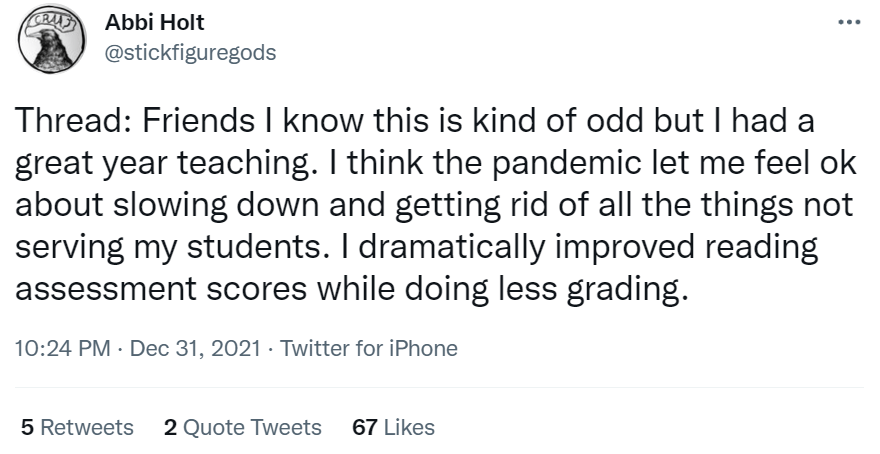Abbi Holt had a great thread sharing a 6-year progression of practices that have made even teaching through a pandemic tolerable! Here it is with some commentary on why you should look into doing similar things, if not the very same…
Why This Works? #1
Not only is moving slowly and steadily a more responsive approach to teaching learners in the room, but reducing grading is crucial in carving out space for everything that positively impacts teaching and learning.
Why This Works? #2
Assessing translation causes us a great deal of work, far too often getting nitpicky over gender, number, case, syntax, person, mood, tense, etc., all without much benefit. No one needs this, especially if those kinds of assessments are graded. Comprehension questions in English eliminate the possibility that a student misunderstood the target language question. In a genuine communicative setting, the student could ask for clarification. In an artificial test setting, however, asking questions in the target language has no purpose, and often involves misunderstanding. When misunderstandings are graded, that can lead to inequity. Even if equity is being maintained, at the very least this practice can be quite frustrating for the student, with their grade is unnecessarily lowered all because of a teacher’s decision to test in the target language. Don’t do it if you don’t have to.
Why This Works? #3
There’s no need (and actually very few reasons) to spend time on grammar while learning a new language, period. Whereas some consider teaching grammar foundational, it can be highly reduced, if not eliminated altogether, and still end up with students learning a new language. N.B. Other content areas could take the same cue. Instead of giving a quiz on Math skills, assess something a student needs to know and/or do that has the skill embedded. It will be clear from that assessment if they’re missing the skill. Don’t spend time assessing at the skill-level. Go straight to what students do with the skills.
Why This Works? #4
Homework is one of the most inequitable practices still widely practiced, yet so simple to eliminate. We simply cannot monitor or support students once they leave school, period. It’s all just hope, and much of that hope is empty. Some kids will read Latin at home. Most won’t. Accept it. Instead of expecting that, though, move everything into the classroom space and carve out time for students to read. Generally, most teachers discover that they can reduce or eliminate what they *thought* was “the work” of learning their content while students still learn just as well, if not better, without it. Consider whether “the work” you assign is what’s necessary, and adjust accordingly.
Why This Works? #5
Yep, skip the tests! Testing doesn’t result in learning. We should do as little of it as possible. N.B. Abbi has a Total Points system. Most assessments are ~10 points, so a student’s grade in a quarter with 20 assessments is their combined score out of 200. This works because everything graded takes place during class. A Total Points system will hide strengths and weaknesses depending on what’s being graded, but it’s essentially a single category so it can work by eliminating “grade-killers,” which are grading categories having so few scores in them that a low score tanks the average beyond hope (e.g., a Tests category with just 2 tests). Most quarter and/or course failures I’ve seen are the result of zeros and “grade-killers.”
Why This Works? #6
This is similar to skipping the assessment of what some consider foundational skills (e.g., grammar knowledge), instead going straight to the *purpose* of what the skills are used for (i.e., reading). N.B. Other content areas, again, could also take the same cue. Instead of giving a vocab quiz in History, assess something a student needs to know and/or do that has the vocab embedded. It will be clear from that assessment if they know the words. Go straight to what students do with the words.
Why This Works? #7
The freedom to vary pace is important, and one that not enough teachers have autonomy over. To be clear, they should, and as of right now there are very few mandated pacing guides for second languages. That means pacing is mostly something departments have established, which might need an overhaul, as well as whether the schools have chosen AP or IB. Remember, those are choices, and any single educator can be an effective vehicle for change. Also, having back-pocket-plans is always helpful. For example, I used my archery videos for a day’s class after reading about Sagittārius. Those videos have been ready-to-go for years, intended to be sub plans, but I got other videos for that and realized it supported what we were reading anyway.
Why This Works? #8
The “learning loss” narrative is a myth. Abbi’s students are exactly where they need to be, and are successful. Could you imagine a teacher instead choosing to move at a faster rate only to have grades suffer? Teacher decisions like that have too much power over a student’s GPA. There’s no reason for it.
Why This Works? #9
Some students can process language faster, but aren’t necessarily so far ahead of others as we might think. These students don’t need more work. They need higher-order thinking questions to respond to, higher level books to read, and opportunities (not forced) to interact by writing and speaking Latin. Encourage, and invite.
Why This Works? #10
And there it is. These are practices that support a sustainable career. There’s not much else to it!









